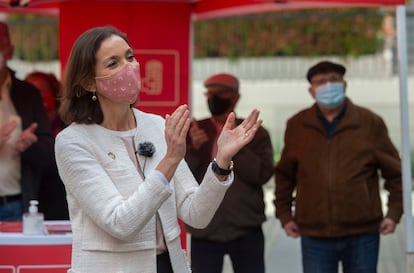Tourism minister: ‘Spaniards can start planning their vacations’
Reyes Maroto told television station La Sexta that citizens will be able to travel normally this summer, at least within the country
Spanish tourism minister receives letter with bloody knife
Spain’s Tourism Minister Reyes Maroto announced on Friday that citizens will be able to travel normally this summer, at least within the country. “Spaniards can start planning their vacations,” she said in an interview with Spanish television channel La Sexta. Maroto added that she expects more visitors will arrive this summer season than last year, when coronavirus travel restrictions delivered a huge blow to the tourism industry.
“Realistically and cautiously, we are talking about being at half the volume of 2019, which is backed by the forecasts from [Spanish Business Confederation] CEOE and [tourism lobby] Exceltur,” said Maroto.
There are already families that are planning their trips, be it to their second home or a favorite vacation destinationTourism Minister Reyes Maroto
In order for these forecasts to be met, Spain’s Covid-19 vaccination drive needs to continue at a good pace and without further setbacks. According to the latest figures, 22% of the population has received at least the first dose of the vaccines from Pfizer-BioNTech, Moderna and Oxford-AstraZeneca, and 8% have received the two doses needed for full protection. The Spanish government is aiming to have 70% of the adult population vaccinated by the end of summer.
“We are facing a very different summer [from last year], where we have the vaccination drive, which is the best tool to reactivate travel and the economy,” said Maroto. “This is going to ensure we can travel safely.”
According to Maroto, some Spaniards have begun to make hotel reservations. “There are already families that are planning their trips, be it to their second home or a favorite vacation destination. We will be taking measures to build confidence and so that we can travel safely,” she said.
Maroto added that restrictions on travel within Spain will begin to be lifted on May 9 when the state of alarm is set to come to an end. “It’s good news because we are beginning to see the end of the tunnel,” she said.
For the past six months, the state of alarm has allowed the regions – which are in charge of the vaccination drive as well as controlling the pandemic in their territories – to introduce coronavirus restrictions on fundamental rights, such as movement. Once this emergency situation ends, regional governments will, however, still have the power to close the perimeter of their regions as well as to lock down provinces, municipalities and even neighborhoods under the 1986 public health law, according to legal experts.

With respect to the European Union’s “Digital Green Certificate,” which allows citizens of Europe to enter Spain without having to quarantine or take a coronavirus test, Maroto said the measure is set to be available from mid-June. Designed to facilitate movement, the certificate is a digital and physical document, with a QR code that will allow a country’s authorities to check three different pieces of information: if the bearer has been vaccinated, if they have had the coronavirus and if they have had a test that confirms they are not currently infected with the virus. “It’s an instrument to being to recover the international mobility that Spain needs to reactivate the sector,” explained Maroto.
The tourism minister also announced that trips for the elderly organized by the public services agency Imserso will resume in October. “Nearly all seniors are vaccinated and, as such, they can start thinking about a destination they want to travel to. It is our way of repaying our seniors,” she said.
Maroto added that overnight stays fell 54% in March compared to figures from the same month in 2020. This is much smaller than the nearly 90% drops recorded in previous months. But the fall is also due to the fact from mid-March last year, Spain was under a home lockdown and all tourist accommodation was closed.
English version by Melissa Kitson.
Tu suscripción se está usando en otro dispositivo
¿Quieres añadir otro usuario a tu suscripción?
Si continúas leyendo en este dispositivo, no se podrá leer en el otro.
FlechaTu suscripción se está usando en otro dispositivo y solo puedes acceder a EL PAÍS desde un dispositivo a la vez.
Si quieres compartir tu cuenta, cambia tu suscripción a la modalidad Premium, así podrás añadir otro usuario. Cada uno accederá con su propia cuenta de email, lo que os permitirá personalizar vuestra experiencia en EL PAÍS.
¿Tienes una suscripción de empresa? Accede aquí para contratar más cuentas.
En el caso de no saber quién está usando tu cuenta, te recomendamos cambiar tu contraseña aquí.
Si decides continuar compartiendo tu cuenta, este mensaje se mostrará en tu dispositivo y en el de la otra persona que está usando tu cuenta de forma indefinida, afectando a tu experiencia de lectura. Puedes consultar aquí los términos y condiciones de la suscripción digital.









































